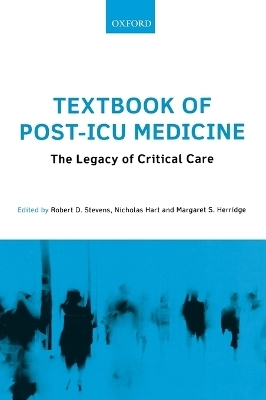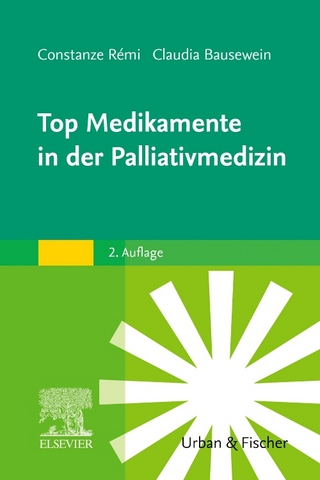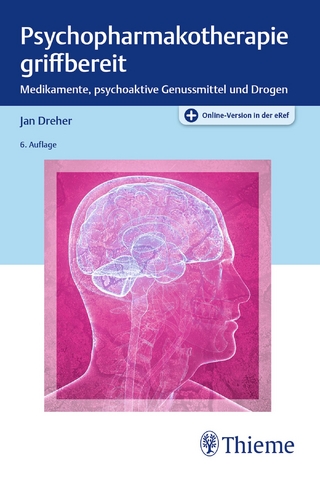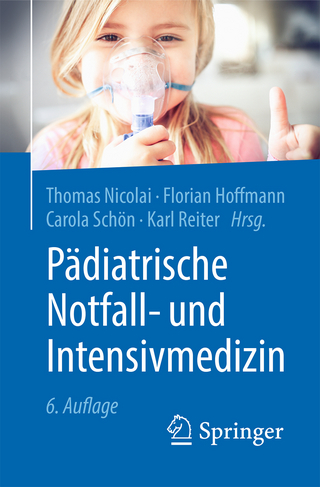
Textbook of Post-ICU Medicine: The Legacy of Critical Care
Oxford University Press (Verlag)
978-0-19-965346-1 (ISBN)
Surviving critical illness is not always the happy ending we imagine for patients. Many ICU survivors suffer from a range of long-lasting physical and psychological issues such end stage renal disease, congestive heart failure, cognitive impairment, neuromuscular weakness, and depression or anxiety, which affect their overall quality of life and ability to lead productive lives. This lingering burden or 'legacy' of critical illness is now recognized as a major public health issue, with major efforts underway to understand how it can be prevented, mitigated, or treated. The Textbook of Post-ICU Medicine: The Legacy of Critical Care discusses the science of the recovery process and the innovative treatment regimens which are helping ICU survivors regain function as they heal following trauma or disease.
Describing the major clinical syndromes affecting ICU survivors, the book delineates established or postulated biological mechanisms of the post-acute recovery process, and discusses strategies for treatment and rehabilitation to promote recovery in the ICU and in the long term.
The chapters are written by an interdisciplinary panel of leading clinicians and researchers working in the field. The book serves as a unique reference for general practitioners, internists and nurses caring for long term ICU survivors as well as specialists in intensive care medicine, neurology, psychiatry, and rehabilitation medicine.
Robert Stevens, Associate Professor, Department of Anesthesiology Critical Care Medicine, Johns Hopkins University School of Medicine, Johns Hopkins Hospital, Baltimore, USA, Nicholas Hart, Clinical Research Consultant, Respiratory and Critical Care Medicine, National Institute of Health Research, Guy's & St Thomas' NHS Foundation Trust and King's College London, London, UK, Margaret Herridge, Director of ICU Research, Critical Care and Respiratory Medicine, University Health Network, University of Toronto, Toronto, Canada
1. Life After the ICU ; 2. Critical Illness and Long-Term Outcomes Worldwide ; 3. Mortality After Critical Illness ; 4. The Role of Long-Term Ventilator Hospitals ; 5. The Overlap of Palliative Care and Critical Illness ; 6. Patterns of Recovery After Critical Illness ; 7. Quality of Life After Critical Illness ; 8. Costs and Resource Utilization in Prolonged Critical Illness ; 9. Caring for the ICU survivor: The Family Caregiver Burden ; 10. Survival and Recovery: A Patient's Perspective ; 11. One Family's Perspective on the Legacy of Critical Illness ; 12. Chronic Organ Dysfunction Following Critical Illness ; 13. Chronic Multiple Organ Dysfunction ; 14. Prolonged Respiratory Insufficiency and Ventilator Dependence in the ICU ; 15. The Long-Term Outcomes of Acute Kidney Injury ; 16. Severe Burn Injuries and Their Long-Term Implications ; 17. Consequences of Endotracheal Intubation and Tracheostomy ; 18. Cognitive and Behavioural Disorders Following Critical Illness ; 19. Cognitive Impairment Following Critical Illness ; 20. Depressive Mood States Following Critical Illness ; 21. Post-Traumatic Stress Disorder Following Critical Illness ; 22. Sleep Disorders and Recovery from Critical Illness ; 23. Neuromuscular and Musculoskeletal Disorders Following Critical Illness ; 24. Long-Term Implications of ICU-Acquired Muscle Weakness ; 25. Bone and Joint Disease Following Critical Illness ; 26. Biological Mechanisms of Injury and Repair ; 27. Genetic Determinants of Sepsis Outcomes ; 28. Physiological Reserve and Frailty in Critical Illness ; 29. Cognitive Reserve ; 30. Pathophysiology of Acute Kidney Injury, Repair, and Regeneration ; 31. Myocardial Remodelling after Myocardial Infarction ; 32. Sepsis-Associated Encephalopathy ; 33. Critical Illness Neuropathy, Myopathy, and Sodium Channelopathy ; 34. The Impact of Critical Illness and Skeletal Muscle Structure ; 35. Skeletal Muscle Mass Regulation in Critical Illness ; 36. Malnutrition in Critical Illness: Implications, Causes, and Therapeutic Approaches ; 37. Therapeutic and Rehabilitation Strategies in the ICU ; 38. Choice of Renal Replacement Therapy and Renal Recovery ; 39. Ventilator Liberation Strategies ; 40. Rethinking Sedation in the ICU ; 41. Sleep-Promoting Strategies ; 42. Effects of Insulin and Glycaemic Management on Neuromuscular Function ; 43. Physical and Occupational Therapy in the ICU ; 44. Neuromuscular Electrical Stimulation: A New Therapeutic and Rehabilitation Strategy in the ICU ; 45. Exercise and Early Rehabilitation in the Intensive Care Unit ; 46. Therapeutic and Rehabilitation Strategies in the Post-ICU ; 47. Assessment of Peripheral and Respiratory Muscle Strength in ICU ; 48. Clinical Pathways for the Continuum of Rehabilitation ; 49. Prolonged Weaning ; 50. Models of Rehabilitative Care after Critical Illness ; 51. Post-ICU Rehabilitation ; 52. Narratives of Illness and Healing after the ICU ; 53. ICU Follow-up Clinics
| Erscheint lt. Verlag | 29.5.2014 |
|---|---|
| Verlagsort | Oxford |
| Sprache | englisch |
| Maße | 187 x 253 mm |
| Gewicht | 1244 g |
| Themenwelt | Medizin / Pharmazie ► Medizinische Fachgebiete ► Intensivmedizin |
| ISBN-10 | 0-19-965346-1 / 0199653461 |
| ISBN-13 | 978-0-19-965346-1 / 9780199653461 |
| Zustand | Neuware |
| Haben Sie eine Frage zum Produkt? |
aus dem Bereich


